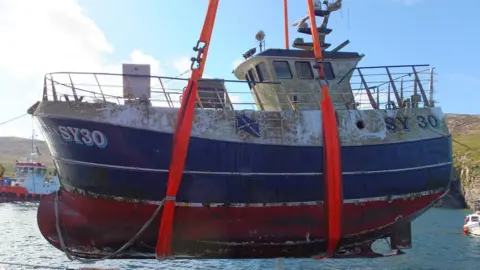Louisa life raft failure led to deaths of three fishermen
 MAIB
MAIBThree fishermen drowned after their boat's hold flooded with water and their life raft failed to inflate, a sheriff has determined.
The Louisa sank on 9 April 2016 as it lay at anchor in calm seas off Mingulay in the Outer Hebrides.
Following a fatal accident inquiry (FAI), Sheriff Principal Derek Pyle said a decision could not be reached on the cause of the flooding.
He said the life raft did not inflate because its gas canister was empty.
Sheriff Principal Pyle said the CO2 cylinder had not been filled by a subcontractor during a service.
The crab boat's skipper Paul Alliston, 42, from Lewis, crewmen Chris Morrison, 27, from Harris, and Martin Johnstone, 29, from Halkirk, Caithness, died.
Only Lachlann Armstrong, from Stornoway, Lewis, survived after swimming ashore.
The Stornoway-registered Louisa was raised to help investigators understand what caused the fatal incident.
In his determination, Sheriff Principal Pyle said the men's chances of survival was directly linked to the failure of the life raft to inflate.
He said: "If the crew had been able to climb aboard an inflated life raft they almost certainly would have survived, given that the general weather and sea conditions were benign."
 Police Scotland
Police ScotlandThe FAI also identified an issue with the men's lifebelt buoyancy aids.
The determination said the men were found face down in the sea when the belts failed to hold them in a position where they might have been able to breathe.
The sheriff principal said there was no evidence a better design would have saved their lives, adding that it was hoped international rules on how this type of belt was manufactured would solve this problem.
The FAI heard that the crew's alert to the boat's sinking was detected and transferred through a number of sites to a search and rescue centre in Stornoway.
The centre was unable to contact the Louisa, and it "took time to establish the boat's exact location".
Once this was done, Barra lifeboat and a coastguard helicopter from Stornoway were launched.
In his determination, the sheriff principal commended the Barra lifeboat crew for their efforts, while also recording that the Maritime and Coastguard Agency had made changes to update and enhance its response to satellite distress beacon alerts.
He said this included improved computers and the immediate mobilisation of search and rescue without exact location information, in expectation that more accurate details would follow.
Sheriff Principal Pyle expressed his sincere condolences to the families and to the friends of the men who died.
